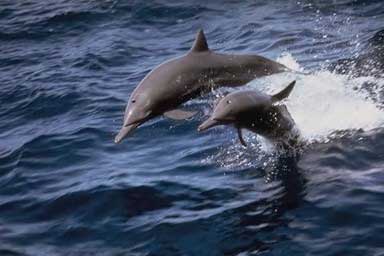Dolphins spinning like?
Rotated dolphins had to work hard to keep this nickname. In a spectacular jump to the air, they can rotate themselves to 7 rounds. Scientists now explain that acrobatic mechanism with mathematical models and underwater videos.

Dolphins had to turn themselves right from the water to be able to achieve extremely fast speeds when taking themselves into the air
Before "take off", dolphins began spinning themselves right from the water. Using flippers as if they were wings, the animal began rolling its body gently. This movement is quite slow because of its tail and flippers wiped, causing the water resistance to increase.
That's like waving your hands in a bathtub, Anthony Nicastro, a physicist from the University of West Chester, said. "You can feel the resistance due to the water you are pushing around," Nicastro explained. " Dolphins have flippers, a dorsal fin and other barrier surfaces. Under water, they only spin 1-2 cycles per second ."
But when the animal escapes from the surface, everything changes.
Once you throw yourself into the air, the dolphin will throw away all the resistance that slows its speed underwater. And that's when everything is ready for whirlwind. On the water surface, the dolphin swings can perform up to 7 times its roll in just a second.
Previous studies have speculated that dolphins produce rotational movements by twisting the body, but after escaping to the surface. " You won't be able to rotate so much with just one slippery jump. It doesn't mean anything in a real-world model, " commented biologist Frank Fish, also from the University of West Chester.
By calculating, the mathematical model of Nicastro came up with accurate descriptions of how these rotations took place.
But why?
No one knows for sure why the dolphin turned its body like that. There can be many types of reasons: such as showing status, position notification, hunting or just playing around.
Or it could be an easy way to get rid of the fish that are clinging to it, like the mackerel - a fish with dorsal fins, acting as cups, sucking on sharks and dolphins. They cause dolphins to increase resistance or irritate their sensitive skin. When dolphins jump into the air and rotate themselves, the pressed fish will fall off.
" If the dolphins don't rotate, the fish presses still stick to it. Only the swinging action will dislodge these annoying parasites, " Nicastro said.
T. An
- Dolphins die massively along the US coast
- Discover new humpback dolphins near Australia
- Revealing new ancestors of modern dolphins
- Young dolphins save the herd of more than 100 pigs from the strands
- Extremely shocking studies of dolphins
- A series of dolphins die abnormally in America
- Establish new protected areas to protect rare dolphins
- Dolphins also kill fellow species for entertainment
- Create 'human chains' to save the herd of dolphins trapped under the bridge
- Unexpected truth about dolphins that few people know
- Meet the dolphins stranded, never drop them back naturally because ...
- How will the world stop spinning and change the world?
 Animal 'suffering' after hibernation
Animal 'suffering' after hibernation Why do goats climb well?
Why do goats climb well? Scientists were surprised to see chimpanzees eating turtles
Scientists were surprised to see chimpanzees eating turtles Giant catfish died deadly due to drought in Thailand
Giant catfish died deadly due to drought in Thailand